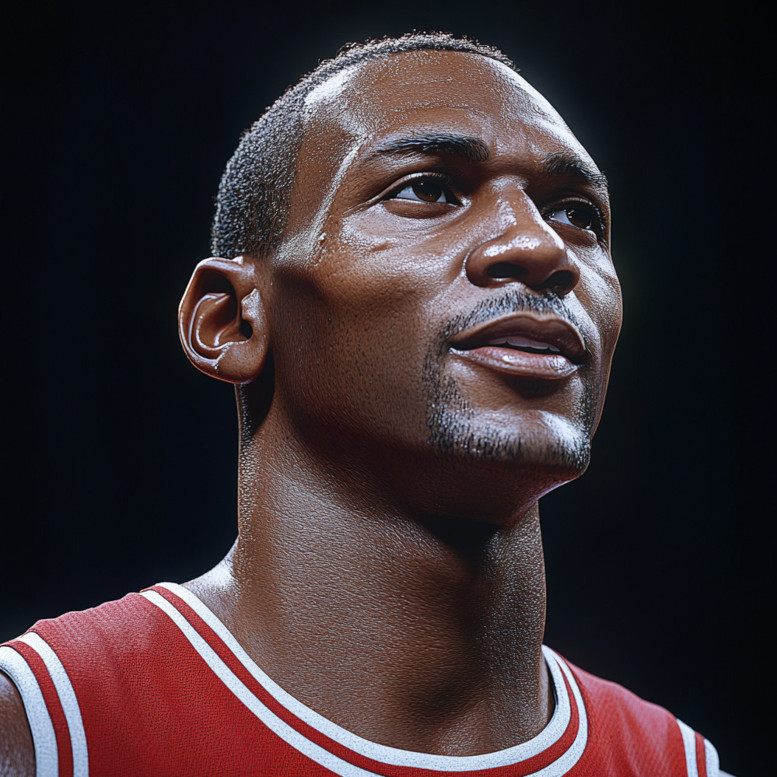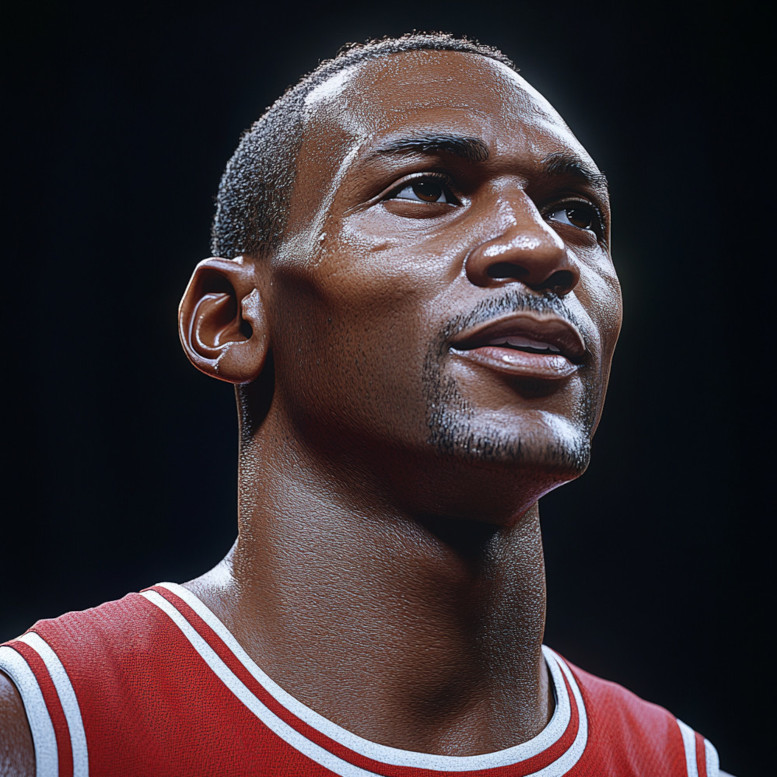


Michael Jordan (born February 17, 1963) is widely regarded as one of the greatest basketball players of all time and one of the most iconic athletes in sports history. Known for his incredible athleticism, competitive spirit, and clutch performances, Jordan's impact on the game of basketball and global sports culture is unparalleled. Over his illustrious career, Jordan led the Chicago Bulls to six NBA championships, earned five NBA Most Valuable Player (MVP) Awards, and became a global ambassador for the sport. His influence extends beyond the basketball court, as he has also made significant contributions to popular culture, business, and philanthropy.
Early Life and Background
Birth and Family Background: Michael Jeffrey Jordan was born on February 17, 1963, in Brooklyn, New York, but he was raised in Wilmington, North Carolina. He was the fourth of five children born to James and Deloris Jordan. His father worked as a maintenance supervisor, and his mother was a bank teller. The Jordan family emphasized the importance of hard work, discipline, and education, values that Michael carried throughout his life.
Early Interest in Sports: Jordan developed a love for sports at a young age, playing baseball, football, and basketball. Despite being cut from his high school varsity basketball team as a sophomore due to his height (he was only 5'11" at the time), Jordan used the setback as motivation to improve his game. He trained rigorously, and by his junior year, he had grown to 6'3" and earned a spot on the varsity team. Jordan's dedication and talent quickly made him a standout player.
College Career at North Carolina: After a stellar high school career, Jordan attended the University of North Carolina at Chapel Hill (UNC) on a basketball scholarship. As a freshman in 1982, he made a name for himself by hitting the game-winning shot in the NCAA championship game against Georgetown, securing the title for North Carolina. Jordan played three seasons at UNC, earning multiple accolades, including the Naismith College Player of the Year Award in 1984. His college success laid the foundation for his entry into the NBA.
NBA Career and Achievements
Drafted by the Chicago Bulls (1984): Michael Jordan was selected by the Chicago Bulls as the third overall pick in the 1984 NBA Draft. He quickly made an impact in the league, winning the NBA Rookie of the Year Award in 1985. Jordan's combination of scoring ability, athleticism, and defensive prowess made him one of the most exciting players to watch, and he rapidly became the face of the Bulls franchise.
Dominance and Championships with the Bulls:
First Three-Peat (1991–1993): Jordan led the Chicago Bulls to their first NBA championship in 1991, defeating the Los Angeles Lakers in the NBA Finals. This victory marked the beginning of a dynasty, as the Bulls went on to win two more consecutive championships in 1992 and 1993, completing their first "three-peat." During this period, Jordan's individual achievements were also remarkable; he won three consecutive NBA Finals MVP Awards and was named the NBA's regular-season MVP in 1991 and 1992.
First Retirement and Baseball Career: In October 1993, at the height of his career, Jordan shocked the sports world by announcing his retirement from basketball. His decision was influenced by the murder of his father, James Jordan, earlier that year. Seeking to honor his father's dream, Jordan pursued a career in professional baseball, signing a minor league contract with the Chicago White Sox. While his baseball career was short-lived and less successful, it demonstrated his love for sports and his willingness to take on new challenges.
Return to Basketball and Second Three-Peat (1995–1998): Jordan returned to the NBA in March 1995, famously announcing his comeback with a simple two-word press release: "I'm back." Despite the Bulls falling short in the 1995 playoffs, Jordan quickly regained his form. The following season, he led the Bulls to a record-breaking 72-10 regular-season record and another NBA championship in 1996. The Bulls went on to win two more championships in 1997 and 1998, completing their second three-peat. Jordan's performance during these years further solidified his status as the greatest player in NBA history. He won two more NBA MVP Awards (1996, 1998) and was named Finals MVP in all three championship victories.
Second Retirement and Washington Wizards (2001–2003): After winning his sixth NBA championship in 1998, Jordan retired for the second time. However, his competitive spirit eventually led him back to the game. In 2001, at the age of 38, Jordan returned to the NBA, this time with the Washington Wizards, a team he also had a minority ownership stake in. While he was no longer the dominant force he had been in his prime, Jordan still performed at a high level, averaging over 20 points per game during his two seasons with the Wizards. He retired for the final time in 2003.
Playing Style and Legacy
Playing Style: Michael Jordan was known for his versatility, athleticism, and competitive drive. His ability to score from anywhere on the court, combined with his unmatched leaping ability and acrobatic finishes, made him a nightmare for defenders. Jordan was also a tenacious defender, earning nine NBA All-Defensive First Team selections. His work ethic and dedication to improving every aspect of his game were legendary, and he was renowned for his leadership on and off the court.
Cultural Impact: Beyond his basketball skills, Jordan's influence extended to popular culture and global sports marketing. His partnership with Nike led to the creation of the Air Jordan sneaker line, which became a cultural phenomenon and remains one of the most successful and recognizable brands in the world. Jordan's marketability and charisma helped make him a global icon, transcending the sport of basketball.
Accolades and Honors: Michael Jordan's list of accolades is extensive. He was a 14-time NBA All-Star, a 10-time scoring champion, and a 6-time NBA Finals MVP. He was inducted into the Naismith Memorial Basketball Hall of Fame in 2009. Jordan's No. 23 jersey is retired by the Chicago Bulls, and he is widely regarded as the greatest basketball player of all time, often being the standard by which other players are measured.
Post-Playing Career and Business Ventures
Charlotte Hornets Ownership: After retiring from playing, Jordan remained involved in the NBA. In 2010, he became the majority owner of the Charlotte Bobcats (now the Charlotte Hornets), becoming the first former player to own an NBA team. While the team has experienced mixed success under his ownership, Jordan's involvement continues to influence the franchise and the broader NBA.
Business Ventures and Philanthropy: In addition to his ownership of the Hornets, Jordan has been involved in various business ventures, including endorsements, real estate, and partnerships with brands like Gatorade, Hanes, and Upper Deck. His estimated net worth, which exceeds $2 billion, makes him one of the wealthiest athletes in history.
Jordan is also known for his philanthropy, having donated millions of dollars to various causes, including education, disaster relief, and social justice initiatives. In 2020, he pledged $100 million over 10 years to organizations dedicated to promoting racial equality and social justice.
Legacy and Cultural Significance
Cultural Icon: Michael Jordan's impact on sports and culture is immeasurable. He revolutionized the way athletes are perceived, marketed, and compensated, paving the way for future generations of athletes. His influence extends beyond basketball, as he remains a symbol of excellence, determination, and the pursuit of greatness.
Inspirational Figure: Jordan's journey from being cut from his high school team to becoming the greatest basketball player of all time serves as an inspiration to countless people worldwide. His famous quote, "I've failed over and over and over again in my life. And that is why I succeed," encapsulates his relentless pursuit of success and his willingness to learn from setbacks.
Documentary and Continued Popularity: Jordan's legacy was further solidified with the release of the documentary series The Last Dance in 2020, which chronicled his career and the Chicago Bulls' 1997-1998 championship season. The documentary captivated audiences and reignited discussions about Jordan's impact on basketball and his status as the greatest player of all time.
Michael Jordan is not only the greatest basketball player in history but also one of the most influential figures in sports and popular culture. His extraordinary talent, fierce competitiveness, and drive to win have left an indelible mark on the NBA and inspired generations of athletes and fans. Jordan's legacy as a cultural icon, business mogul, and philanthropist continues to grow, ensuring that his influence will be felt for many years to come.

We use cookies
We use cookies and other tracking technologies to improve your browsing experience on our website, to show you personalized content and targeted ads, to analyze our website traffic, and to understand where our visitors are coming from. Privacy Policy.